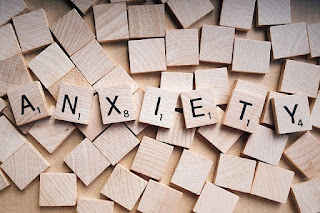We say that anxiety is a mental illness, but few people appreciate exactly what this means. So let’s talk about Julie.
Julie’s Story
Julie doesn’t like to go out. “I’m a bit plump, my family are not rich, and I can’t afford designer handbags,” she says. “When I go out, people will judge me.”
When Julie gets a new job, she is excited. She doesn’t aim for CEO but she wants a decent career path so she has enough money to live without worrying about bills. She hopes to buy a house at some point or to travel.
 |
| Social Anxiety Disconnects Us |
But as Julie doesn’t like to go out, she goes to the office and then goes straight home. She doesn’t join her colleagues for the weekly after-office drink, and works from home as much as she can.
When her line manager points out that she’s disconnected from the team and that upper management don’t know her, Julie feels nervous.
She wants to be seen but when next invited to go out for a drink, she refuses. She also ducks out of the annual dinner.
To herself she says, “I do my job. That is all that matters.” But secretly she thinks that if she goes out, they’ll judge her.
Julie does a great job. However, six months later she misses out on a promotion. The boost goes to a colleague who is less able than Julie, but he is the bloke who is there, chatting with the bosses at the bar and smooching at the annual corporate dinner.
Because whether we like it or not, business decisions are influenced by connection and friendship.
Everyday Choices or Anxiety?
 Julie thinks she’s making everyday choices. However, the truth is that her fears are sabotaging her career advancement.
Julie thinks she’s making everyday choices. However, the truth is that her fears are sabotaging her career advancement.
Here is what we miss when we talk about anxiety being a mental health issue:
Anxiety creates a nightmare world and convinces us that it is real.
When you live with anxiety, you live in a nightmare – but you don’t see it! You think you are perfectly okay but the truth is that your life is constrained by your fears.
Key Takeaway: when your fears prevent you from living your best life, you have an anxiety issue.
Recognizing Social Anxiety
Here’s what social anxiety looks like:
You have an intense fear of being judged.
You avoid social situations.
If you are in a social situation, or maybe just thinking of one, you are nervous.
You are convinced that you suck at being social.
Summary: if it’s a choice between conversation or Zombie Apocalypse, you’re eating brains.
Why Social Anxiety Is Increasing
According to studies, social anxiety is increasing. Sifting through hundreds of studies, one analysis in 2023 pointed out that the COVID-19 pandemic led to a 25.6% increase in anxiety disorder cases (76.2 million additional cases) and a reset is likely to be slow.
I believe there are several factors fueling social anxiety:
Talking has been largely replaced by texting. So when you do meet people face to face, just chatting feels weird. It is also more immediate. You can check a text; it’s harder to filter your words.
Online communication is forever. Young adults are used to having every single word they’ve said picked apart and criticized by the pack.
Plus, what they thought when they were 12 is still held against them when they’re 28. It’s unfair, and damaging.
Because of the factors above, I see Gen Z as a traumatized generation; young people have been attacked and harassed to the point where they are often shut down.
The pandemic is important because it has added to the disconnect. But we were already well on the way to trouble.
In a broader sense, social convention and social space architecture are now focused on separation (wrongly dubbed ‘privacy’)
Schools put desks in rows, not in small groups.
Teachers let students do group work with their close friends instead of encouraging them to work randomly with others in their class or year.
Coffee shops and canteens have moved from communal tables to individual tables. Even pubs have individual tables instead of communal bars and tables.
Social disconnect is increasing to the point of absurdity.
I saw a promotion this week for a bus company trip to the next town that highlighted, “We promise never to seat you next to a stranger” meaning they will make sure you have an empty seat next to you rather than ask you to *gasp* sit next to someone for 2 hours!!!
Overcoming Social Anxiety
 |
| Don’t let fear clip your wings; you deserve to soar. |
The tricky bit about anxiety is that there is usually a kernel of truth in the nightmare. There are people who judge others by the pound or bank balance. That says something about them, not us.
Julie knows this! But anxiety is a mental health issue, remember?
While a bit of Julie knows her fears are irrational, the main effect is that it is overwhelming.
The key to effective change is exposure. In non-therapy speak, Julie needs to build up positive experiences to rethink her reality.
In sessions, Julie actively challenges her negative thoughts, practices her social skills in a safe space, and then slowly creates positive experiences in real life.
It is a gradual process where each positive experience helps build up her confidence.
So, if you see a bit of Julie in you, know you’re not alone. Also, there is help.
Don’t let fear clip your wings; you deserve to soar. Message me today via email ellen.whyte@gmail.com or WhatsApp: +44 7514 408143 for your free 15-minute consultation.
Images by kandhal keshvala, Pete and WOKANDAPIX from Pixabay

